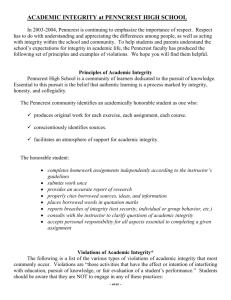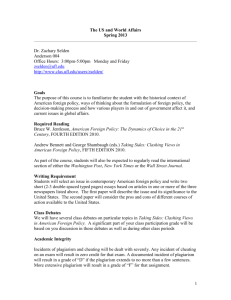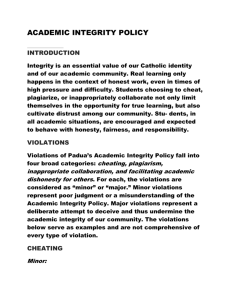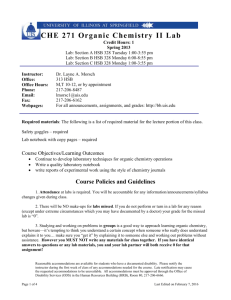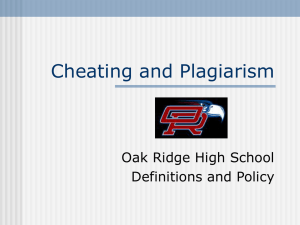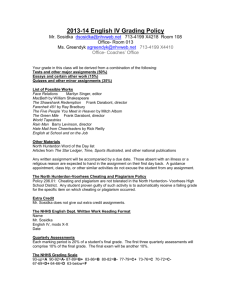Cheating and Plagiarism Policy
advertisement
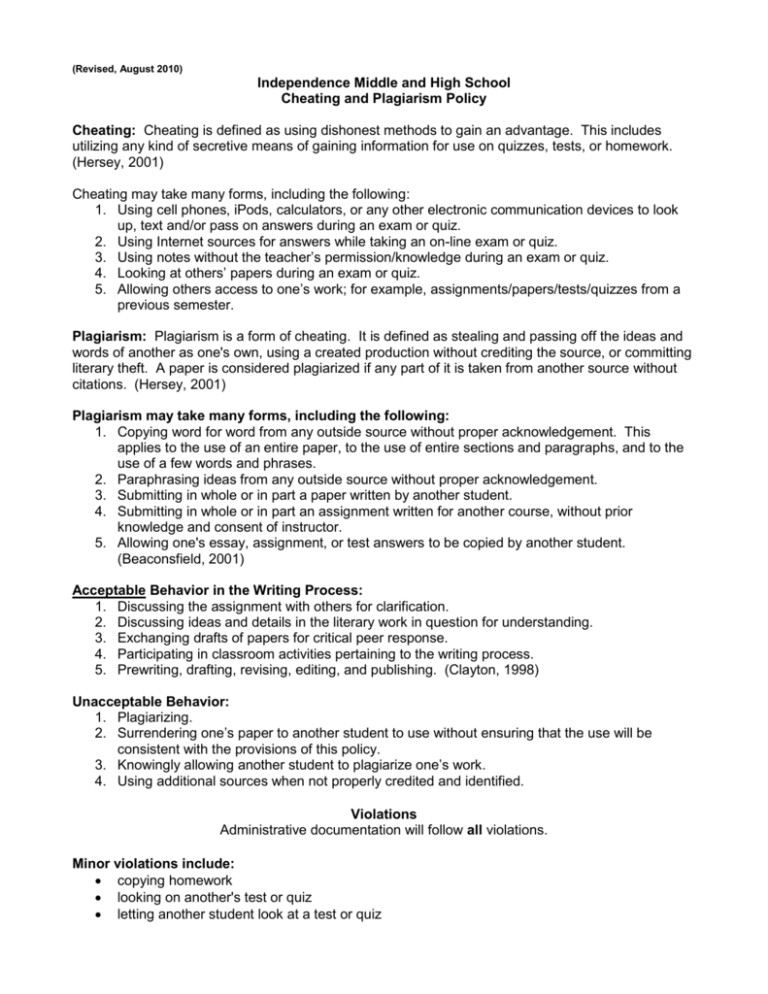
(Revised, August 2010) Independence Middle and High School Cheating and Plagiarism Policy Cheating: Cheating is defined as using dishonest methods to gain an advantage. This includes utilizing any kind of secretive means of gaining information for use on quizzes, tests, or homework. (Hersey, 2001) Cheating may take many forms, including the following: 1. Using cell phones, iPods, calculators, or any other electronic communication devices to look up, text and/or pass on answers during an exam or quiz. 2. Using Internet sources for answers while taking an on-line exam or quiz. 3. Using notes without the teacher’s permission/knowledge during an exam or quiz. 4. Looking at others’ papers during an exam or quiz. 5. Allowing others access to one’s work; for example, assignments/papers/tests/quizzes from a previous semester. Plagiarism: Plagiarism is a form of cheating. It is defined as stealing and passing off the ideas and words of another as one's own, using a created production without crediting the source, or committing literary theft. A paper is considered plagiarized if any part of it is taken from another source without citations. (Hersey, 2001) Plagiarism may take many forms, including the following: 1. Copying word for word from any outside source without proper acknowledgement. This applies to the use of an entire paper, to the use of entire sections and paragraphs, and to the use of a few words and phrases. 2. Paraphrasing ideas from any outside source without proper acknowledgement. 3. Submitting in whole or in part a paper written by another student. 4. Submitting in whole or in part an assignment written for another course, without prior knowledge and consent of instructor. 5. Allowing one's essay, assignment, or test answers to be copied by another student. (Beaconsfield, 2001) Acceptable Behavior in the Writing Process: 1. Discussing the assignment with others for clarification. 2. Discussing ideas and details in the literary work in question for understanding. 3. Exchanging drafts of papers for critical peer response. 4. Participating in classroom activities pertaining to the writing process. 5. Prewriting, drafting, revising, editing, and publishing. (Clayton, 1998) Unacceptable Behavior: 1. Plagiarizing. 2. Surrendering one’s paper to another student to use without ensuring that the use will be consistent with the provisions of this policy. 3. Knowingly allowing another student to plagiarize one’s work. 4. Using additional sources when not properly credited and identified. Violations Administrative documentation will follow all violations. Minor violations include: copying homework looking on another's test or quiz letting another student look at a test or quiz using other secretive methods of giving answers on a test or quiz taking information from another source that is not properly cited working with others on an assignment that was meant to be done by individuals Minor violations will be dealt with by the teacher in the classroom, and the principal will be informed. Consequences are at the discretion of the teacher and may range from a zero for the assignment to a referral for disciplinary action. Major violations include: “copying and pasting” papers or sections of papers from the Internet, publications, or other students illegally obtaining any part of a test to use for oneself or to give/sell to others doing homework or writing papers for another student allowing others access to one’s work; for example, assignments from a previous semester Major violations are considered severe and will be dealt with by the teacher, the Principal and the parent(s). Repeated violations may be dealt with on the Disciplinary Step System. An Honesty Clause will be in effect: students have 24 hours from submission time to notify the teacher of violation. This will afford the student the opportunity to redo the assignment at 50% of its original worth. All violations can be considered theft; therefore, any student who is guilty of any of the above will receive consequences that may range from a zero on the suspect assignment to failure in the class or classes if the violations occur in more than one course. Any essay, assignment, or test that shows any evidence of plagiarism in any form may receive a failing grade, with the distinct possibility of a zero. Students found guilty of these violations will be ineligible for selection to the National Honor Society for their next eligible year. All violations will be subject to review by the National Honor Society Selection Committee. References Beaconsfield High School Department of English. (2000, November 24). Plagiarism Policy. Retrieved April 19, 2002 from the World Wide Web: http://www.novalink.ca/bhs/Plagiarism.html John Hersey High School. (no date). Cheating and Plagiarism Policy. Retrieved April 19, 2002 from the World Wide Web: http://jhhs.dist214.k12.il.us/plagiarismpolicy.htm McCullen, C. (2002, April). Preventing digital plagiarism. Technology & Learning, April 15, 2002. Retrieved May 15, 2002 from the World Wide Web http://www.techlearning.com/db_area/archives/TL/2002/04/viewpoint.html

